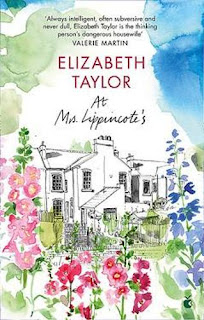William Trevor was 81 when he wrote this book and had lost none of his subtle yet devastating prose. Here is Ellie, a foundling, married to the older Dillahan whose first wife has been lost to tragedy. We are in Rathmoye, a small, quiet Irish town where gossip makes up fro the lack of drama. So the story is Ellie's, making the most of her new life having left the convent behind, the Nuns finding her a second hand marriage. Respecting, but not "in love" with her hardworking husband.
But the appearance of Florian Kilderry, a younger man, almost a loser, alone in his big house after the death of his artist parents, catches Ellie's eye. Their relationship (and Ellie's with her husband) is told with great sensitivity by this wondrous writer. Florian's house is Shelhanagh, gone to seed by the useless son, 18 rooms from his mother's inheritance. "Flies of some other summer darkened the windows". There are other characters who are beautifully described, and I dawdled over Trevor's light touch. It's a shame I only have his short story collections left to read.
This is the first book that Elizabeth Taylor had published andi t did feel as if she was finding her voice. She is uncompromising in her concentration on everyday life than on plot. Nothing much happens to Julia as she joins Roddy, her RAF officer husband, and her son Oliver, at the requisitioned house belonging to Mrs Lippincote during the second world war, of which we hear almost nothing. Julia is a bit of a mystery, hard to pin down, educated certainly (wasted in the 40's) attractive, prone to tears but shabby and unfulfilled.
Also with them is Eleanor, a cousin, whose thread with some Marxist friends I found
a little tedious. But then I found she had been given some of the best bits. "The Daily Worker ... is an admirable paper in many ways, but for wrapping up meat .... it is entirely inadequate". When Eleanor thinks Julia has been prying in her room "It was not that she anything to conceal, but that she had nothing to conceal". You have to think about it. At one of her meetings "(He) slowed down the momentum, so that the meeting could be neatly rounded off, tied up like a parcel, laid on a shelf with all the ghosts of other meetings."
Then a description of "green tiled pubs on a corner" took me right back to where we lived in London in the fifties, at the age of ten, I can still imagine the beery smell as I passed the door of that pub a few doors down on the corner of Napier Road and Holland Road. Nothing like it's current replacement, The Crown and Septre, a chic hotel with fine dining.
Perhaps if this was not given such a good review on the BBC book programme "Between the Covers", I might have missed this novel. Jean is thirty nine years old, single and stuck at home looking after her semi-invalid mother. It's 1957 and Jean has no social life and no man in sight. Only her job on a local newspaper makes her life worthwhile. But not even a drink after work.
There is little about her early life, only the after effects of losing her beloved father. However, the main thread of the novel is Jean's relationship with a family where the mother is convinced her daughter was the result of a virgin birth. The paper is interested and gives Jean the backing to pursue the story. All nicely written and fairly absorbing. Until that awful ending that disappointed most readers.



No comments:
Post a Comment